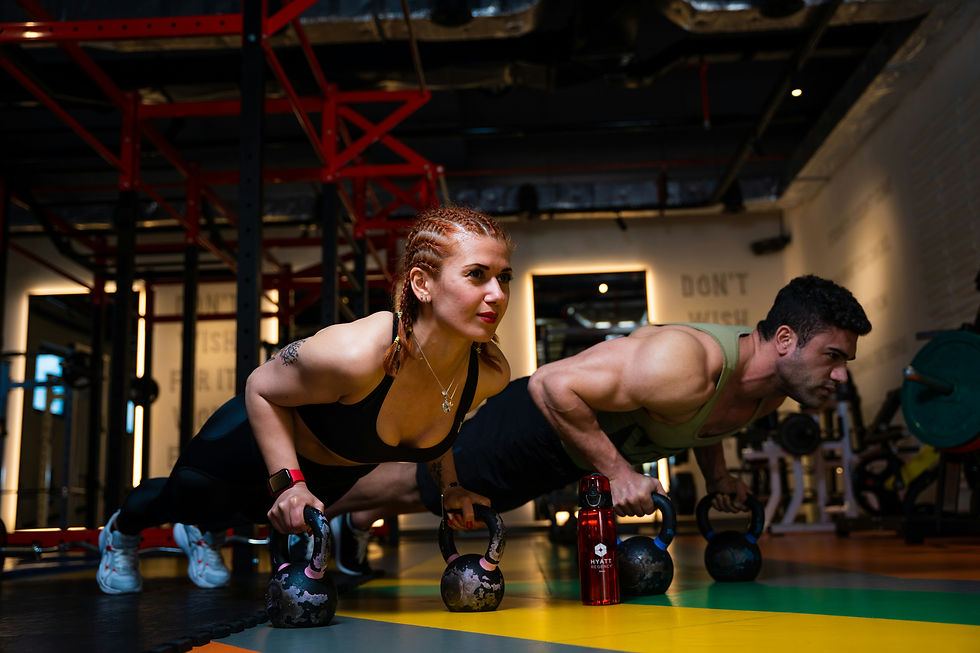What's the Hype with Hydration?
- Marcia Puc
- Jun 16, 2023
- 3 min read

Water bottles. They are everywhere. It got me thinking, when did we actually start consciously thinking that we needed to have water with us wherever we went, within arms reach? Is it just a marketing ploy or is there some validity to having water available at a moment’s notice? Were we not drinking enough before the “carrying a water bottle craze” took root?
Of course, no one would dispute that water is essential for life. Humans cannot survive more than three to four days without water. But, how much should we drink on a daily basis? As with most things related to health and wellness, there is a bit of controversy. Some say, you need 8 glasses a day (64 ounces), some say more, and some say you only need to drink when you feel thirsty. This can be very confusing to those of us who want to ensure we are doing everything we can to stay in tip top health.
The bottom line - like almost everything else, is that it depends on each individual.
Factors to consider when determining how much water you need:
Where you live - hot climate = drink more
Age - older/younger individuals = drink more
Pregnant or Nursing Mothers = drink more
High activity level = drink more
Foods you eat/salty food = drink more
Certain health conditions (heart/kidney) = be careful not to over consume
We lose water over the course of the day through breathing, perspiration and elimination. This is a good starting place in determining how much you need to replenish your hydration. If you are exercising heavily or sweating a lot because it’s 100 degrees with 100 percent humidity; drink more. If you are not feeling well and have digestive issues, make sure you are hydrating. Older and young people are at particular risk for dehydration as they do not have the same thirst sensitivities as others.
Some good rules to follow to know if you are drinking an adequate amount of water: you rarely feel thirsty and your urine is colorless or light yellow (can vary due to medications).
There are many benefits to drinking an adequate amount of water throughout the day.
Benefits of water:
Helps detoxify the body of waste (through elimination and perspiration)
Regulates our body temperature
Lubricates and cushions our joints
Protects sensitive tissue
Keeps us focused
Helps us feel full & satiated
When we don’t have enough water and dehydration starts to set in, we feel tired, headachy, cranky and dizzy.
You need not only rely on water to stay properly hydrated. Hydration can come in many forms besides a tall glass of water, including other liquids (milk, teas, coffee) and foods.
Best Foods to Hydrate Your Body
Fruits & Veggies
Spinach, cabbage, tomatoes, cucumber, zucchini, celery, cauliflower, broccoli, brussel sprouts, bell peppers, melons, peaches, strawberries, blueberries, citrus, apples
Dairy - yogurt, milk, cottage cheese
Broths, Soups, Stews
Herbal Teas
Coconut Water
Smoothies
Dehydration Caution
Too much caffeine consumption (more than 5 cups caffeinated beverage/day)
Alcohol
High protein intake
Salty foods (fast food, cured meats, pickles)
Sugary foods
Ultra processed foods
In closing, I think the hyper awareness of water consumption that seems to have started with the Gen Xers and Millennials is not necessarily a bad thing. It’s hard to drink too much water (but possible), but it’s easy to find ourselves dehydrated and cranky because we haven’t had enough. It’s a good idea to be aware of how much liquid you are consuming both through drinks and foods. The average adult loses between 2-3 liters of water per day through normal activity. You want to be sure you are replenishing this loss.
So, why not have a water bottle available. It’s a good plan. You can avoid going a long duration without liquid and you won’t find yourself in a situation where you have to purchase a bottle of water (bad for the environment and your wallet) .
Tip & Challenge: Before you drink your coffee or tea in the morning, how about drinking a glass of water with lemon? Warm or cool! It’s a great way to get in a few ounces of water and rehydrate after a night of rest.








Comments